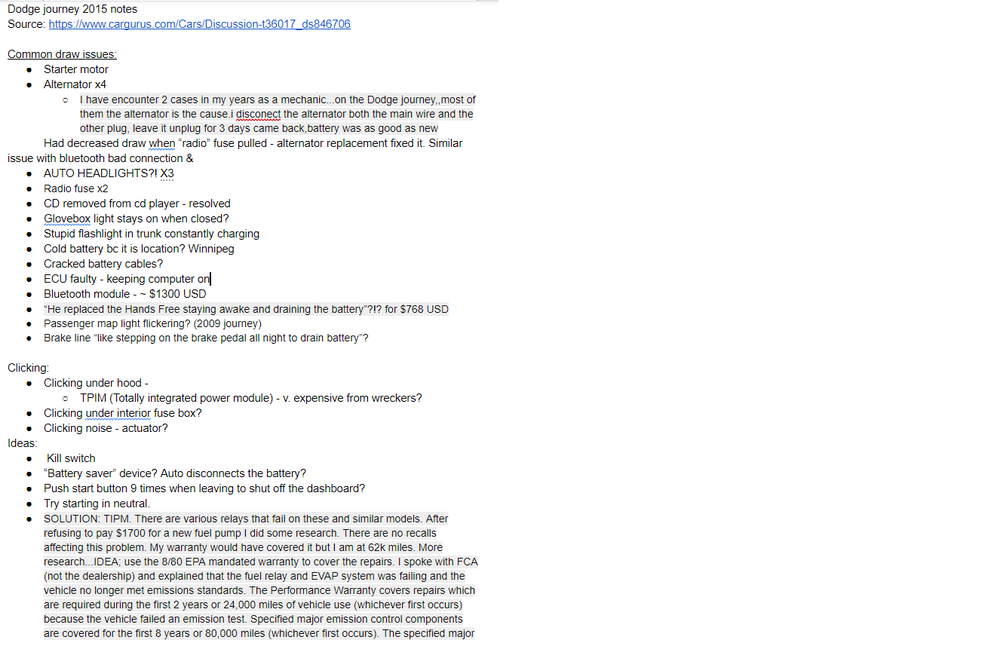-
Posts
216 -
Joined
-
Last visited
-
Days Won
8
Content Type
Profiles
Forums
Gallery
Everything posted by Shawn855
-
I saw the gauge when he topped it up and it was full. The hissing is most likely the slow leak no?
-
Thanks. I also forgot to mention they did put some dye in the system to try and trace the leak. So when I bring it back and they fix the leak, I'll mention that piece of advice to them.
-
All they did was attach their gauge to it, saw it was low on freon, topped it up, then had to use their obd2 tool to get the compressor to kick back on again.
-
Freon was empty for a year and finally got a chance to bring it to my shop to have it topped up. I still suspect a leak, as I hear some hissing from time to time when the ac is on. Idle is good. But ya I definitely don't have a strong grasp on AC systems so I'll just deal with it for now until something more obvious breaks down.
-
Nevermind. The fan does kick on when the ac is running. Any other ideas why the AC isn't blowing very cold when vehicle is stationary ?
-
At what temperature should the radiator fan kick on its lowest setting. Also is there a way to force the fan to kick on such as turning the AC on? Currently I noticed that my AC is not blowing very cold unless I'm driving the vehicle which normally points to a fan issue and now that I think about it I haven't seen my fan kick on ever really, though I keep an eye on my temp and it never goes above 105 celcius. Thanks
-
2010 Dodge journey lower balljoint nut torque spec is 70 ft-lbs. confirmed.
-
So I was having this issue last summer. And I ended up having unrelated battery parasitic draw issues this past winter which required me to pull some fuses until I figured out the issue. Regardless, one of the fuses I ended up pulling was for the HVAC. Front and rear. This wasn't the issue, however I noticed since pulling and reseating those fuses, my climate stopped randomly turning on. Could be a coincidence but just posting it here in case it helps.
-
Yes. I'm hoping it's this fuse causing grief. However could still be alternator. Voltage Was 12.72v then decided to take it for a 10 minute drive. Got home, waited an hour and checked voltage and it's only at 12.68? But when idling its charging fine at 14.50. So either the alternator isn't pumping out enough juice while actually driving (I had two seat warmers on, HVAC front and HVAC rear on as well) , or my battery drained quite a bit in the hour it sat. Currently reading another topic about a user who experienced this exact same thing. Unfortunately he never posted a solution. One thing at a time though. First I want to see which fuse is problematic. Then once I figure out that gremlin, I'll move on to the charging issue by connecting my obd2 scanner and monitor the voltage while actually driving to see if it dips.
-
Update: So I threw in the new battery on Tuesday evening. Monitored the voltage since then and there's still a continuous drain. So this morning at 7:30am I pulled the 5 most problematic fuses that are known to have caused drains in the dodge journey: the abs valve fuse, the HVAC fuses (front and back), the radio fuse, and the Bluetooth fuse. I got home at 4:30pm, and checked the voltage and the drain stopped. So for now I put all of the fuses back in, except for the Bluetooth fuse. Will monitor the voltage overnight and go from there. I will say that this drain is tricky since it did not show itself when doing the milliamp draw test. So it's something that's trying to kick back on while vehicle is off. Only time will tell. Will update more as new information arises.
-
That's also a valid theory. Again, it took a few minutes for my ABS valve to go to sleep. Once i saw it went to sleep, i concluded my parasitic draw test. Perhaps if i would have waited another half hour or so, the abs module would have kicked back on again, then off again, drawing voltage. I'll add "remove abs valve fuse" to my list of possible solutions. Whatever drain this is, it's not happening consistently. I found a list of possible solutions online that somebody created when he was facing the same issue. His solution was the TIPM btw. I'll upload it now for reference for those who may be going through the same thing.
-
If it is indeed a faulty alternator, the discharging of the battery from the alternator happens while the vehicle is off, not while being driven. But yes, i have a list of things to try if its not the battery hahah. I'll see if someone can watch my little man tonight while I quickly change the battery so that I can monitor any voltage drop overnight. If it drops, on to the next step!
-
It's true - I agree that I'm perhaps overanalyzing everything ahead of time. It's moreso of a "I can't change the battery yet, therefore i'm trying to gather as much information as possible now, so that if the drain still happens with the new battery, I'll be ready for the next possible solution". Blame my computer job for this mentality. I'll stop testing for now until I change the battery lol sorry.
-
What? I never said the battery was 14.5v......i said it was at 14.7 while vehicle was running, when checking the alternator charging output... These tests are all done with the vehicle off and parked, except for the alternator AC voltage test with vehicle on.
-
I'm thinking battery as well, however i'm still not sold on the alternator being fine. My buddy had this exact same issue happen to him and it was happening at random times as well and it was his alternator draining the battery on random occasions while vehicle was off. I also found a thread where a few journey owners had the same thing happen to them. I decided to do an AC voltage test to see if the alternator's regulator or diodes may be faulty. Typically this is done while the vehicle is running, setting your multimeter to ACV, and putting the positive lead on the positive terminal on the alternator, and the negative lead on a ground and the theory goes that if you see anything more than 0.5v, then the alternator is at fault. Now, i don't have easy access to the alternator due to it being winter, so i did it through less traditional means: I connected the leads to the battery jumping terminals (I've seen a few sites mentioning you can do it this way as well, but i'm still not 100% it's correct and therefore my findings are inconclusive so far). Anyhoo, when connecting the ACV leads to the battery jumping terminals, the voltage showed 31.6v. Which is way past the allowed 0.5v. I'll still be changing the battery this week, but if it's still draining i'll be looking into doing the alternator test properly - straight from the alternator. Your thoughts? Oh and also here's this week's voltage drops from the vehicle being parked for a few days: Parked Vehicle sunday at 6pm after driving and charging battery while driving. 8pm:12.47v 10pm:12.45v Monday: 7:15am:12.41v 11:15am:12.39v 4:30pm:12.38v 6:15pm:12.38v 9:00pm:12.37v Tuesday: 7:30am: 12.35v Looking at this, the drain goes from 0.02 volts every 2 - 3 hrs, down to about 0.02v every 9+ hours. I know older batteries lose charge over time so it could be the battery is still settling down the whatever voltage it can actually hold. (Battery is 5 years old, so i'd guess it would eventually settle at 12.25v). Though it was still showing a slow drain over time, this is much better results when compared to my random decrease to 11.5v last sunday at 4:30pm after sitting for about the same amount of time, and all I did was: -unplug dashcam -disconnect rust prevention module -set interior lights to never turn on (in case they were randomly turning on during the night) So it could be any of these things, or none of these things if it's a bad alternator or bad battery. I'll be throwing in the replacement new walmart battery tomorrow and restart my testing over a few days to see if it's still slowly losing charge.
-
Big screen yes. I'll try removing the bluetooth and radio fuses to eliminate them as probable causes. The battery has already been load tested but the shop had mentioned that batteries that pass these tests can certainly still be bad. Random thought: My alternator is charging my battery at 14.70 - 14.75v. Is that not too high? Therefore it's overcharging my batteries, thus killing them?
-
Update: so there's no parasitic draw. I simply wasnt waiting long enough for the abs module to be put to sleep. Normal draw on battery is 10 milliamps now which is well within spec. Decided to swap walmart battery to my old battery for testing purposes. Vehicle would start everyday and it seemed like that was the cause. However vehicle sat for 2 full days this weekend and vehicle would not start. Voltage 11.55 volts. Still could be a battery issue (Walmart battery faulty/bad connection, old battery weak) but here's the differences between both batteries and testing phases: Walmart battery would die overnight sometimes and when it did, the dash would be flickering like crazy, and the relays under the hood would be chattering like crazy, on and off until I disconnect battery. Old battery was fine everyday but died after two days of sitting. But when it would die, the dash would be fine. No flashing or flickering or chattering relays. It would simply not start, and it would show the low voltage indicator on the dash. Alternator charging at 14.70 volts btw. This tells me it could still be a battery issue. I swapped the old Walmart battery for a new one and I'll be throwing it in the dodge when I get some time. Probably next Thursday. Couple thing I did as well for testing purposes: disconnected my rust prevention module. And disconnected my dashcam.
-
Fuse tester wouldn't be accurate in my current situation, because as mentioned above if I remove the fuse and reinsert it, the drain stops until I restart the draw test. So removing the fuse, and inserting the tester would show zero drainage, thus leading to more confusion. That's why I was kinda thinking PCM as the issue. If it was the TIPM, I would think that the drain would continue after reinserting the fuse during the testing. But as it is now it's like it's forgetting to put abs valve to sleep after engine turns off. But then we remove the fuse, reinsert it and it remains off, reducing the amp draw from 500 milliamps to 60 or less milliamps. I could just pull the fuse but then I'd be screwed if I got into a major accident and they saw the fuse was pulled.
-
Yeah I saw the mention about the brake pedal switch. If it were that, wouldn't the brake lights be on while the vehicle is turned off? That fuse draw circuit tester looks like a great tool to test with, but since I already know that pulling that specific fuse reduces the draw, I'd say that using that tool would be redundant in my case. I'll probably still end up buying one however lol.
-
From my very limited knowledge in this area, what I can recall is that the TIPM controls what electronics go to sleep when the vehicle is turned off. If I pull that abs fuse, and the draw goes down, but then reinsert the fuse, the draw stays down. If I restart the draw test, the fuse is back to drawing 500 milliamps. My buddy is a mechanic at a local shop and said he changed a lot of TIPM, as well as PCM and when I did the research, there's another board with over 100 posts about the issue I'm facing. Some were narrowed down to the Bluetooth module, and some to the radio, while others was the PCM and others the TIPM. Edit: acronym mistakes, because it's 7:50am
-
Ignition was off for an hour. No other odd symptoms. Walmart brand battery. Don't remember the CCA but I remember I did my research back then and ensured it was more than the stock battery at the time. Battery itself was tested at a shop and it passed. Alternator fine as well. Not going to start blaming battery when I see it clear as day that abs fuse is drawing 500 milliamps, when the norm is 50 - 80. (Last I heard, dodge spec was 35 milliamps).
-
Miss me? Just kidding. So this morning i went to start my 2016 dodge journey sxt with 88,000kms on it, and the battery was completely dead. Battery is only 6 months old. Charged it right up and tested for parasitic draw. When testing, I quickly saw the 500 milliamp draw. When removing the ABS Valve fuse, the draw shot down to 60 milliamps. Any ideas on what this could be? In my head I'm thinking TIPM, and PCM. Both are expensive naturally.
-
No. The reason why I obtained the manual specifically for the 2016, is because I noticed the torque specs varied from year to year. Not by a lot, but still. Specifically the brakes if I recall correctly. They increased the torque specs for the brakes in later years of the journey. You can compare for yourself, by going to cardiagn.com, where the 2015 journey torque specs are located and compare them with my 2016 specs.
-
Yep, I believe they pinned my post, containing all the torque specs. Lemme know if you can't find it.
-
Good call. I'll take a good look at it.






